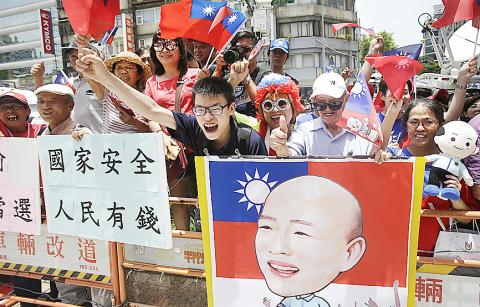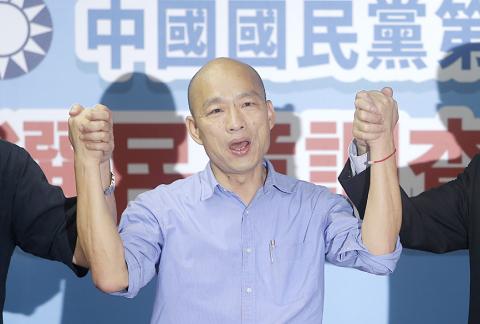The Chinese Nationalist Party (KMT) is to nominate Kaohsiung Mayor Han Kuo-yu (韓國瑜) as its candidate for next year’s presidential election after he beat Hon Hai Precision Industry Co (鴻海精密) founder Terry Gou (郭台銘) by 17 percentage points in the primary.
Han received an aggregated support rate of 44.805 percent in the polling, conducted from July 8 to Sunday, KMT Vice Chairman Tseng Yung-chuan (曾永權) said yesterday at KMT headquarters in Taipei.
Gou received an aggregated 27.73 percent support, while former New Taipei City mayor Eric Chu’s (朱立倫) total was 17.9 percent, former Taipei County commissioner Chou Hsi-wei (周錫瑋) got 6.02 percent and Sun Yat-sen School president Chang Ya-chung (張亞中) 3.544 percent, Tseng said.

Photo: Chiang Ying-ying, AP
Poll data released by the KMT showed that Han’s support ratings were the highest when matched with fellow KMT members and with outside competitors.
When respondents were asked who of the five candidates they would vote for for president, more than 51 percent chose Han, while about 34 percent chose Gou and 13 percent chose Chu, the poll found.
Asked to choose between Han, President Tsai Ing-wen (蔡英文) and Taipei Mayor Ko Wen-je (柯文哲), 47.7 percent said they would back Han, 18 percent said Ko and 15.8 percent Tsai, it found.

Photo: Chiang Ying-ying, AP
Asked to choose between Gou, Tsai and Ko, 29.2 percent said Gou, 14.6 percent said Ko and 14.1 percent said Tsai, it found.
Asked to choose between Chu, Tsai and Ko, 20.7 percent said Chu, 18.8 percent said Ko and 15.6 percent said Tsai, it showed.
The poll was conducted by five polling companies and gathered a total of 15,185 valid samples via landlines, the KMT said.
At a news conference at KMT headquarters after the results were announced, Han thanked the party, his fellow candidates and his supporters.
“At this moment I feel no joy in my heart, only great pressure, given the huge challenges ahead,” he said. “With your help, I hope to take up the responsibility and work to create a better future for Taiwan, to safeguard the Republic of China — and to carve out a brighter and more fecund path for our future generations.”
He would review the policies proposed by the other candidates and adopt viable ones, but to ensure party unity, he planned to immediately contact his rivals and arrange visits with them, he said.
While the KMT has been discussing the removal of a clause in its charter requiring a member elected president to double as the party’s chairman, Han said he would “completely respect” the Central Standing Committee’s decision.
Asked if he would step down as mayor to prepare for the presidential campaign, Han said he would do his best to run the city.
“Please rest assured that I would not dare forget my responsibilities as mayor of Kaohsiung,” he said.
Asked about rumors that the Democratic Progressive Party had urged its supporters to back Han in the KMT poll, believing he would be easier to beat, the mayor said it is normal for parties to mobilize their supporters during primary polling.
“The KMT’s presidential primaries have never been unfair,” KMT Chairman Wu Den-yih (吳敦義) said, adding that this primary was the most transparent the party has ever held.
Han is to be formally nominated at the KMT’s national convention on July 28 after the Central Standing Committee reviews his nomination tomorrow.

Intelligence agents have recorded 510,000 instances of “controversial information” being spread online by the Chinese Communist Party (CCP) so far this year, the National Security Bureau (NSB) said in a report yesterday, as it warned of artificial intelligence (AI) being employed to generate destabilizing misinformation. The bureau submitted a written report to the Legislative Yuan in preparation for National Security Bureau Director-General Tsai Ming-yen’s (蔡明彥) appearance before the Foreign Affairs and National Defense Committee today. The CCP has been using cognitive warfare to divide Taiwanese society by commenting on controversial issues such as Taiwan Semiconductor Manufacturing Co’s (TSMC, 台積電) investments in the

HELPING HAND: The steering committee of the National Stabilization Fund is expected to hold a meeting to discuss how and when to utilize the fund to help buffer the sell-off The TAIEX plunged 2,065.87 points, or 9.7 percent, to close at 19,232.35 yesterday, the highest single-day percentage loss on record, as investors braced for US President Donald Trump’s tariffs after an extended holiday weekend. Amid the pessimistic atmosphere, 945 listed companies led by large-cap stocks — including Taiwan Semiconductor Manufacturing Co (TSMC, 台積電), Hon Hai Precision Industry Co (鴻海精密) and Largan Precision Co (大立光) — fell by the daily maximum of 10 percent at the close, Taiwan Stock Exchange data showed. The number of listed companies ending limit-down set a new record, the exchange said. The TAIEX plunged by daily maxiumu in just

INVESTIGATION: The case is the latest instance of a DPP figure being implicated in an espionage network accused of allegedly leaking information to Chinese intelligence Democratic Progressive Party (DPP) member Ho Jen-chieh (何仁傑) was detained and held incommunicado yesterday on suspicion of spying for China during his tenure as assistant to then-minister of foreign affairs Joseph Wu (吳釗燮). The Taipei District Prosecutors’ Office said Ho was implicated during its investigation into alleged spying activities by former Presidential Office consultant Wu Shang-yu (吳尚雨). Prosecutors said there is reason to believe Ho breached the National Security Act (國家安全法) by leaking classified Ministry of Foreign Affairs information to Chinese intelligence. Following interrogation, prosecutors petitioned the Taipei District Court to detain Ho, citing concerns over potential collusion or tampering of evidence. The

‘COMPREHENSIVE PLAN’: Lin Chia-lung said that the government was ready to talk about a variety of issues, including investment in and purchases from the US The National Stabilization Fund (NSF) yesterday announced that it would step in to staunch stock market losses for the ninth time in the nation’s history. An NSF board meeting, originally scheduled for Monday next week, was moved to yesterday after stocks plummeted in the wake of US President Donald Trump’s announcement of 32 percent tariffs on Taiwan on Wednesday last week. Board members voted to support the stock market with the NT$500 billion (US$15.15 billion) fund, with injections of funds to begin as soon as today. The NSF in 2000 injected NT$120 billion to stabilize stocks, the most ever. The lowest amount it